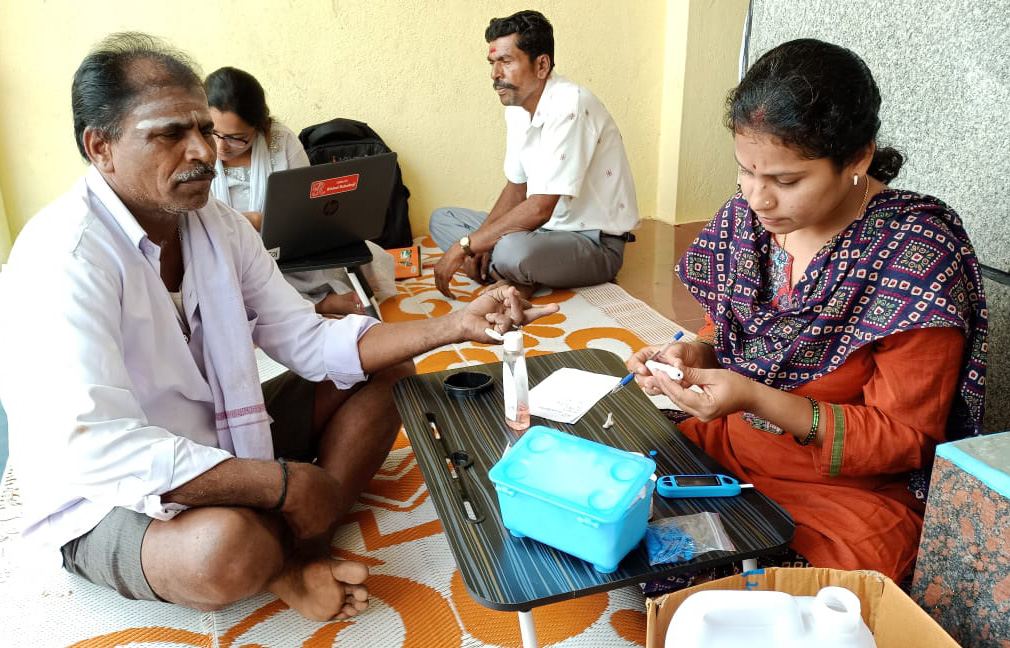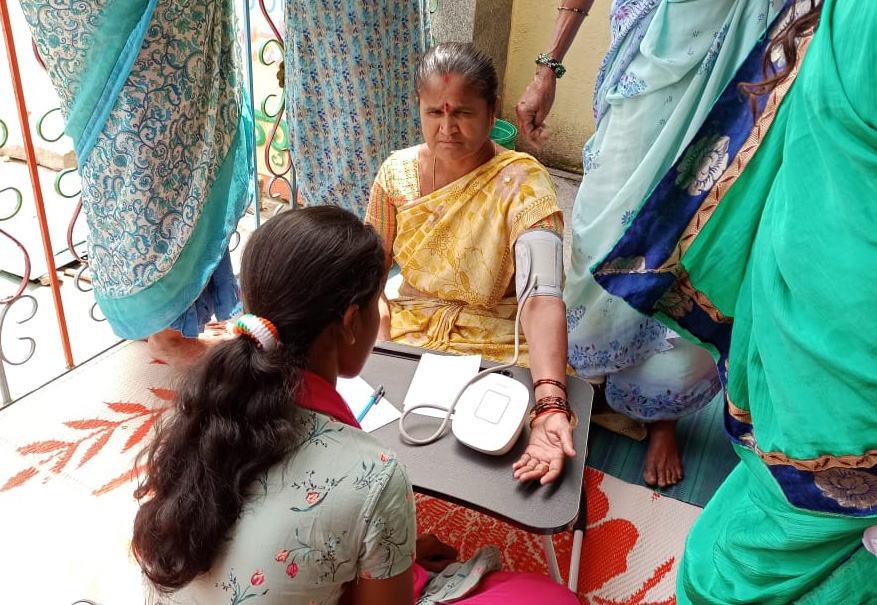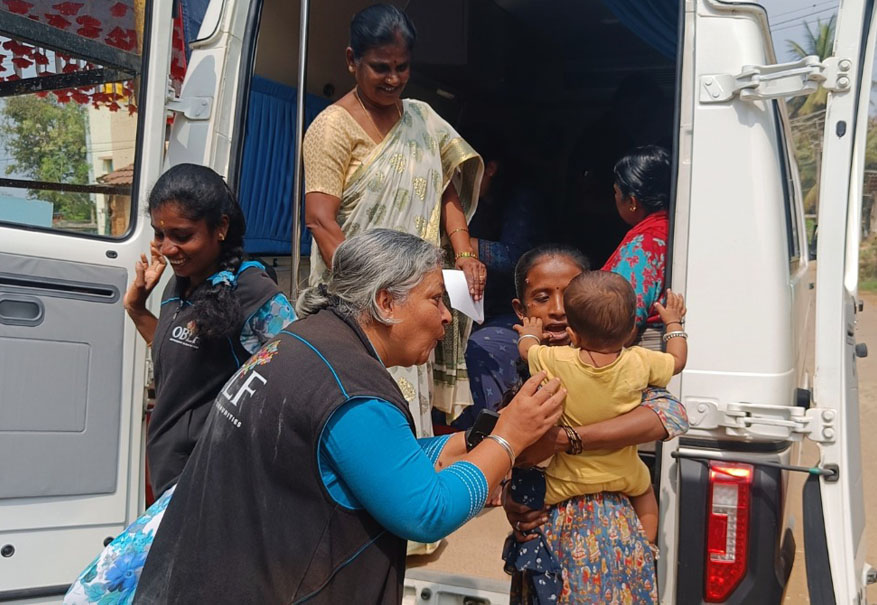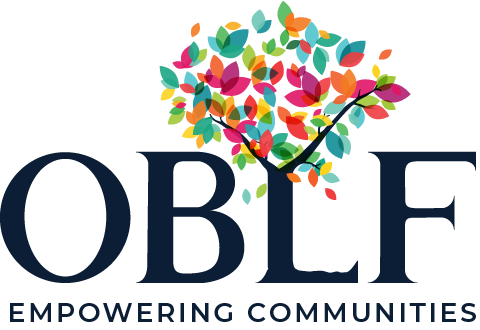Remedy: Holistic Health, Community-Centered Care
India’s rural healthcare system faces critical shortages, particularly in primary healthcare that is available, accessible, acceptable and affordable.
In rural areas like Anekal Taluk, limited access to healthcare services has led to a disproportionate rise in preventable diseases and premature deaths. OBLF’s Remedy program, launched to address these healthcare deficits, focuses on the prevention, management, and treatment of healthcare issues along the Non-Communicable Diseases (NCD) Continuum of Care.
Since 2021, OBLF has made headway into Non-Communicable Diseases (NCD) continuum of care – focussing on primary healthcare access and reducing preventable Cardio-vascular diseases (CVDs) through early screening, detection and management of Hypertension & Diabetes in rural communities. It has established a strong community-centred primary healthcare operational model – comprising frontline health workers, an experienced and committed medical team, and a support team of counsellors, pharmacists, etc.
In the course of this work on primary health care and NCDs – OBLF identified complex challenges faced by older persons, those with Life Limiting Illnesses [LLIs] – often brought about by serious health incidents like strokes, cancers and other health sufferings.
The bleakness of their existence and poverty also serves as the origin of mental health issues in these communities. The prevalence in this population of anxiety, depression, loneliness – and their intersectionality with the other issues, added to the complexity of managing primary health care in rural, constrained settings.
Based on this deep contextual understanding of the situation on the ground, OBLF scaled and evolved its public health program to include and integrate geriatric care, palliative care, screening for cancers, and mental health care for these populations.
- Geriatric and Palliative Care: Specialized care protocols integrating geriatric assessments and care, physiotherapy and rehabilitation, palliative care for persons with Life Limiting Illnesses, and creation of social networks for Older Persons.
- Mental Health Program: Comprehensive care to address anxiety, depression, and loneliness, and other severe mental disorders while enhancing community well-being.
- Health Awareness Initiatives: Community education on preventive health and healthy lifestyles.
Serving over 100,000 people in Anekal Taluk, OBLF aims for meaningful, sustainable improvements in the quality of life for vulnerable populations.

OBLF’s Continuum of Care Framework

OBLF provides accessible, affordable, and predictable healthcare through an integrated system that adapts to evolving community needs. Key services include:
- Periodic Health Clinics: Regular check-ups and preventive care.
- Home Care Visits: Tailored support for the severely ill and disabled.
- Palliative Care at Home: Specialized care for individuals with LLIs, focusing on comfort and quality of life.
OBLF’s approach also emphasizes NCD management, mental health integration, and holistic care for older adults and those with LLIs. By addressing both chronic conditions and mental health issues, OBLF ensures early detection, comprehensive treatment, and continuous management to improve community health in Anekal Taluk.
The initiatives under the Remedy program are committed to providing equitable and sustained primary healthcare to the most vulnerable and marginalized populations. By focusing on the prevention and treatment of non-communicable diseases, mental health, geriatric and palliative care, the program directly contributes to achieving the United Nations Sustainable Development Goal of reducing premature mortality from non-communicable diseases by one-third by 2030.
Primary Healthcare Access
OBLF’s comprehensive public health program serves over 30 remote rural villages, with a combined population exceeding 13,000. The primary healthcare program includes several key components:
- Household Mapping and Demographics: Conducting a detailed mapping of households, family members, demographics, health risks, and health-seeking behaviors within each identified village.
- Early Health Risk Screening: Performing early screening for health risks among rural, disadvantaged populations to identify and address potential issues before they escalate.
- Mobile Health Clinics: Operating mobile health clinics staffed by qualified medical practitioners, providing regular and predictable healthcare services in the identified villages.
- Community-Based Workforce: Skilling and employing local women to carry out mapping, enumeration, field education, and early screening activities. Currently, we have trained and employed 17 frontline health workers across 30 villages.
- Health Education: Promoting positive lifestyle practices aimed at preventing non-communicable diseases, empowering communities to take proactive steps toward better health.
The three primary objectives of this program are:
- Early Detection and Management of Non-Communicable Diseases (NCDs): By focusing on early screening and timely treatment, the program aims to ensure sustained clinical management of NCDs, ultimately reducing the incidence of preventable cardiovascular diseases.
- Lowering Out-of-Pocket Healthcare Costs: The program seeks to reduce the financial burden of healthcare on individuals covered by OBLF’s services, making essential care more accessible and affordable.
- Increasing Detection Rates of NCDs: The program aims to raise the proportion of the population screened for NCDs, enabling more people to receive the care they need through proactive screening and identification efforts.


Geriatric and Palliative Care
Our Geriatric and Palliative care initiative is a comprehensive approach designed to support individuals living with serious illnesses, chronic conditions, or advanced age. This form of care addresses both medical and non-medical needs to improve quality of life for patients. It includes:
- Pain and Symptom Management: Providing relief from pain and other distressing symptoms associated with conditions such as cancer, stroke, and other serious diseases.
- Physiotherapy and Rehabilitation: Offering physical therapy and rehabilitation services to help patients maintain mobility and function.
- Emotional and Psychological Support: Delivering counseling and psychological support to help patients cope with the emotional impact of their illness.
- Family and Caregiver Support: Assisting family members and caregivers by providing guidance, respite care, and support to help them manage the challenges of caregiving.
Palliative care focuses on enhancing comfort, dignity, and quality of life, regardless of the stage of illness or the need for curative treatments. It is an integral part of holistic healthcare, aiming to provide compassionate support for both patients and their families throughout the course of serious illness.
Palliative care is essential because, despite ongoing treatment, many patients continue to experience pain, breathlessness, loss of appetite, and other symptoms that significantly diminish their quality of life. This type of care focuses on enhancing comfort and well-being, often stepping in to manage care when curative treatments are no longer effective or feasible.
OBLF provides palliative care delivered by a dedicated team of experienced medical and paramedical professionals. Our team excels in offering personalized, comprehensive care, tailored to meet the unique needs of each individual, at our Geriatric and Palliative Care Center or through home-based services.
This care is offered free of charge to the economically disadvantaged and underprivileged residents of Anekal Taluk, ensuring that those in need receive compassionate care without financial burden.
OBLF Geriatric and Palliative Care Center
Contact: 9606968964
OPD timings: Monday and Thursday 09:00 am – 12:30 pm
